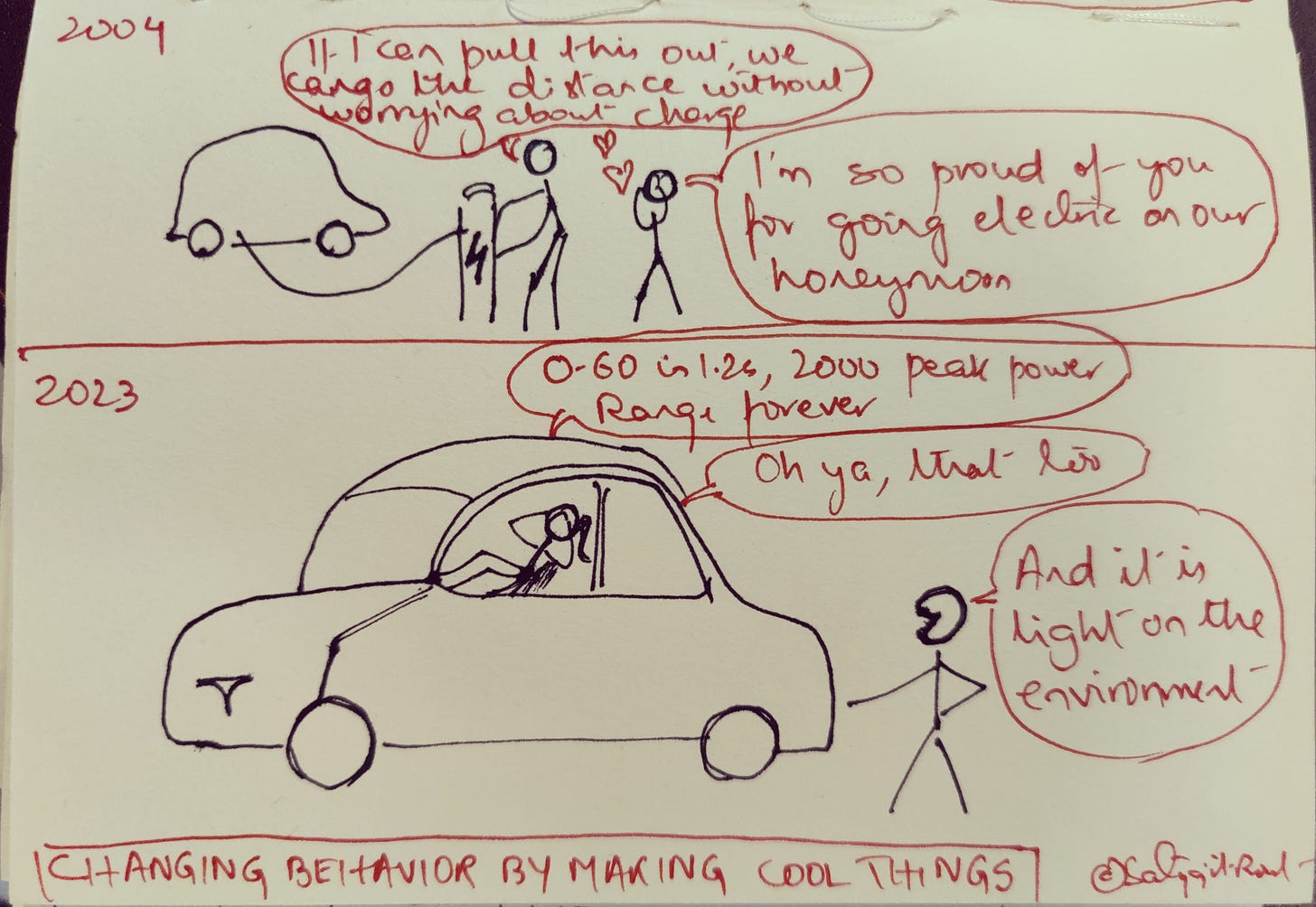#51 - Changing behavior without changing attitude AND competition cures doubt
Plus: a tiny thought
Hi friends 👏
Welcome to Issue #51 of Curiosity > Certainty!
I spent this week unpacking psycho-logical selling (as opposed to logical selling) and perception hacking (how perceptual reality trumps objective reality). You will see some of what I absorbed seep into this issue. And you can also expect more of that, if you tell me that you like this kind of stuff. So without further ado…
Changing behavior without changing attitude
When persuading people to change behavior, a common mistake we make is that we expect them to do something because it is the right thing to do. We reject the fact that they are more likely to do the same thing when it is the easier thing to do.
Littering is a problem across cities in India. The government runs public service campaigns to deter people from littering but that has limited effect. Installing waste bins at regular intervals is a better strategy. It makes a smaller ask of people than having them carry a banana peel in their pocket because they love their city.
This idea travels well. Want to put in place a recycling habit in your building? Gift residents a second bin for waste segregation. Want people to use less non-renewable energy? Make adoption of solar energy easier.
Our attitudes don’t drive our behavior as much as our environments do.
Attitude demands finite things like willpower. A well-designed environment makes no such demand. It just makes you do the thing you need to do feel like the thing you want to.
Appealing to the conscience to effect change is like asking a child to eat greens because of long-term health benefits. We like to think that positive behavior change happens for a bigger cause. Yet, we can improve our chances of changing social behavior if we can stop banging on the drum of bigger cause.
Instead, take away the excuse from people for not doing something. Do you think Elon Musk has changed the hearts of all those who are on the Tesla waitlist? That the car is electric is almost incidental. That it is cool is intentional.
But once people make the switch–to electric, to solar, to recycling–they will come up with reasons to explain their behavior. They will identify themselves as environmentally conscious in market research surveys and in parties. But don’t bank on that for bringing about change. Just design cool things.
Competition cures doubt
As kids with little pocket money, we used to follow a simple rule when picking a street-food cart in the place of my birth: go to the busiest one. The length of the queue was a heuristic we swore by.
Even though our chosen vendor was the most vied for and had the longest wait time, we were reassured it was unlikely to let us down since many others had made the same choice.
Competition is the best antidote to doubt.
We are drawn to competition more than we like to admit. Competition reassures us, turns our doubt into confidence. We see this everywhere: in our choice of domain to specialize in, in our pick of business school, our choice of employer, in the investments we make, and even in our choice of partner. Especially that last one.
Imagine having the hots for that girl in class that nobody else much cares about. You like her, sure, but you can’t at the same time help wonder, Am I missing something? Until another suitor appears on the horizon. Suddenly, your doubts disappear. You’re clear. She’s the one!
Wanting something that others also want is comforting. Because even if you’re wrong, you’re not alone. Every Ponzi scheme is proof of this. For several of Tesla’s initial years, interest in Elon Musk’s project rode on this model of mimetic desire.
Picking something of value that most others have ignored means you’re willing to be wrong and lonely. That’s the cross the first mover, the first investor, the pioneer has to bear. Popular narrative paints them as risk-takers but they are arguably the least competitive. They go to extreme lengths to not run the same race as everyone else. They are willing to live with doubt.
Most of us aren’t willing to make that trade-off. That’s why we crave competition when in fact it threatens our chances of success.
Tiny thought: There’s compounding in bad too
When we think of something bad that may happen, we tend to think of it as the only thing going wrong. That rarely happens though.
The market tanks, you lose money. Losing money pushes you into depression. Depression turns you into a recluse. Recluse eats your relationships.
Suddenly you’re poor, depressed, and lonely. Negative compounding is as powerful, and disastrous. Gotta stop it before it spirals.
***
Thank you, dear reader, for adding Curiosity > Certainty to your inbox. I am grateful for your time and attention. Let me know what you made of this issue.


